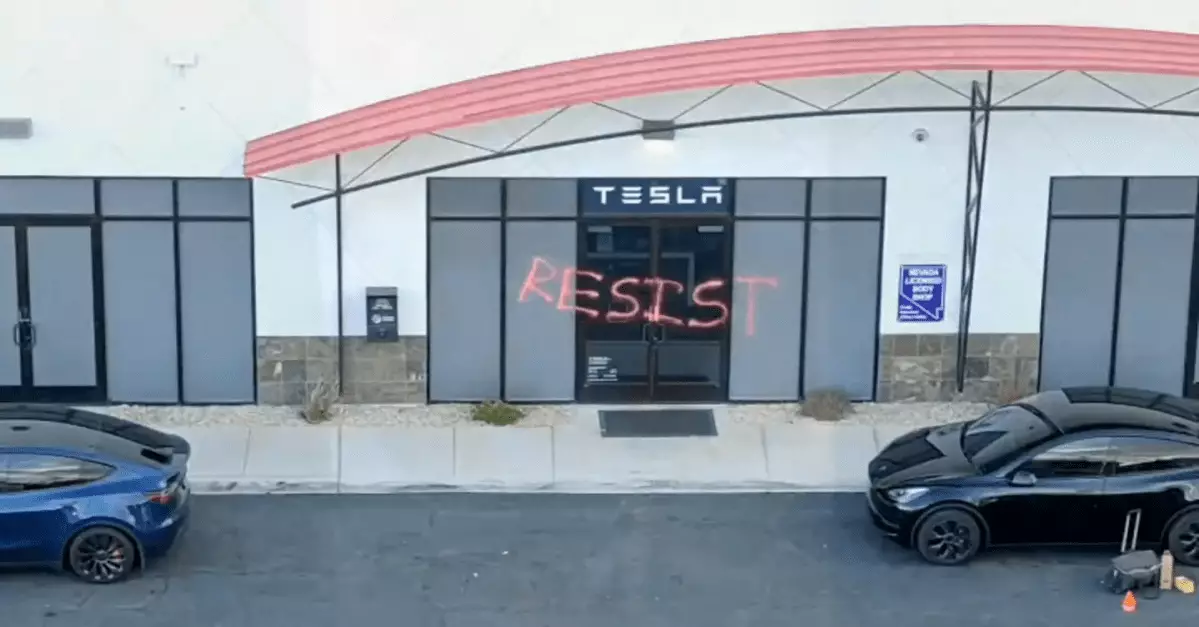The electric vehicle industry is witnessing a disturbing wave of vandalism directed towards Tesla. Recent incidents have not only risked property but also raised questions about public safety and societal tolerance for dissent. Under the auspices of the Trump administration, the notion of categorizing these acts of vandalism as domestic terrorism has emerged, signifying a troubling escalation in how we view such criminal behavior. The incidents are more than mere acts of destruction; they reflect a growing animosity that challenges the very fabric of innovation and progress.
A Chilling Incident in Las Vegas
In a particularly shocking display, a Tesla collision center in Las Vegas became the site of an elaborate arson attack. A suspect, shrouded in all-black attire, hurled Molotov cocktails and discharged a firearm at multiple vehicles, leaving the word “resist” scrawled on the doors. This calculated act not only endangered the property but also posed a severe risk to public safety. According to Deputy Fire Chief Jennifer Wyatt, prompt action by the fire department prevented severe damage by extinguishing the flames before the powerful lithium-ion batteries ignited. Such energy has become a staple in Tesla vehicles, symbolizing both innovation and vulnerability.
The FBI Steps In
The Federal Bureau of Investigation quickly recognized the gravity of the offense, shifting its focus from standard arson investigation to one that involves potential terrorism. FBI Special Agent Spencer Evans expressed grave concerns, urging potential offenders to reconsider their destructive intentions. This pivot underscores how policymakers and law enforcement are reacting to these escalation points in vandalism, reframing ordinary crimes as threats against societal norms and progress. As evinced in this incident, dissatisfaction is bleeding into violent expression, challenging the way we address grievances in society.
Tesla’s Response and Implications for the Brand
Elon Musk has characterized these vile acts as acts of terrorism, positioning Tesla as an innocent victim amidst a wave of unjustified hostility. His remarks on social media reinforced the emotional charge surrounding these acts, galvanizing support for the brand and its mission. By framing Tesla as a persecuted entity simply striving to innovate and revolutionize transportation, Musk has shifted the narrative from that of a corporate giant to a symbol of resilience against adversity. However, this label of ‘terrorism’ also introduces complex implications for the way the public perceives protest and dissent.
A Broader Reflection on Protest and Violence
The events unfolding around Tesla raise larger questions about the acceptable boundaries of protest and the societal implications of resorting to violent methods to express dissent. Why are some individuals resorting to property damage and vandalization instead of advocating for change through dialogue? The transformation of public grievances into acts of aggression challenges our collective responsibility to express dissent constructively. With domestic terrorism provisions being applied, we must aim for a future where disagreement does not lead to destruction but instead fosters productive discourse and an open exchange of ideas.
In an age where science and technology promise a brighter tomorrow, we must reflect on the consequences of our actions and learn to navigate our differences without falling into an abyss of violence and chaos. As the debate over Tesla vandalism continues, it beckons a reconsideration of how we confront our cultural and industrial unease.

